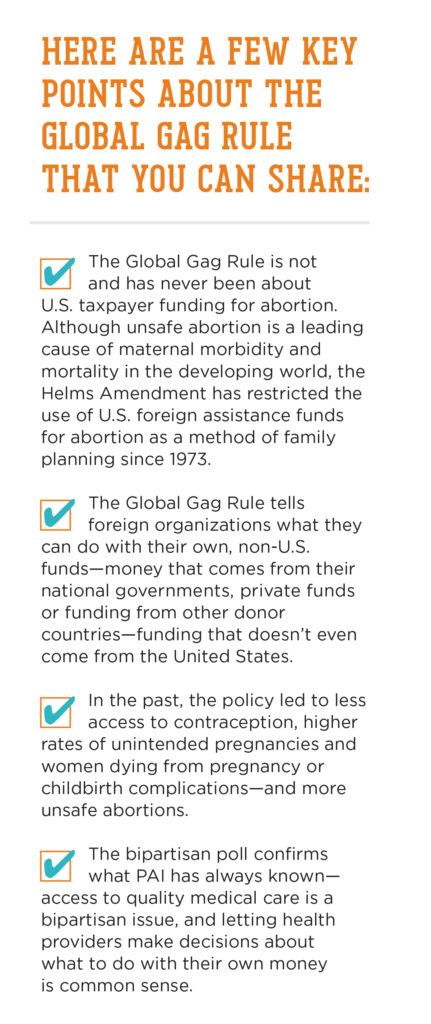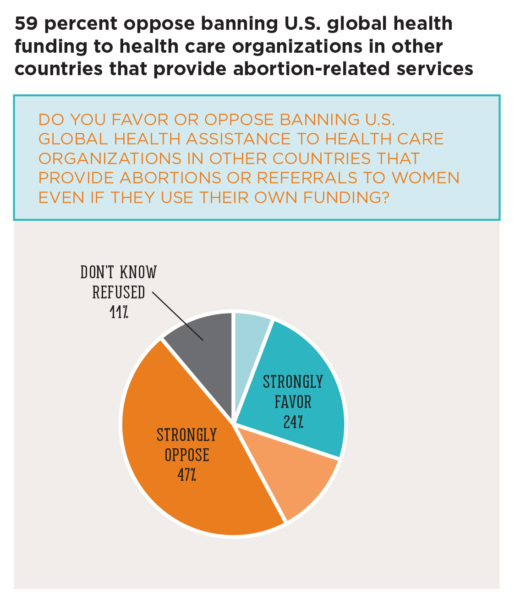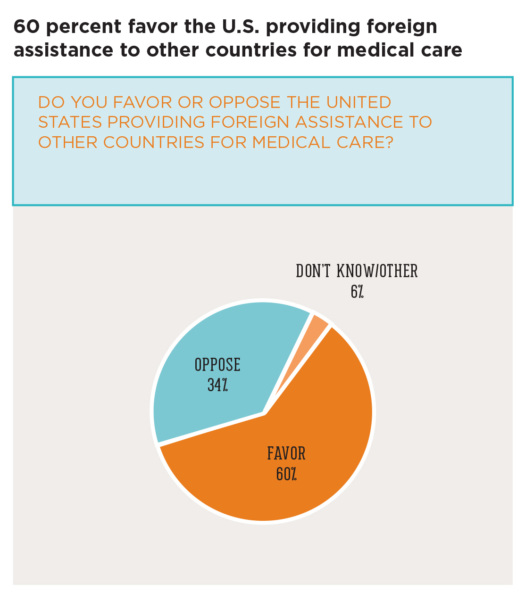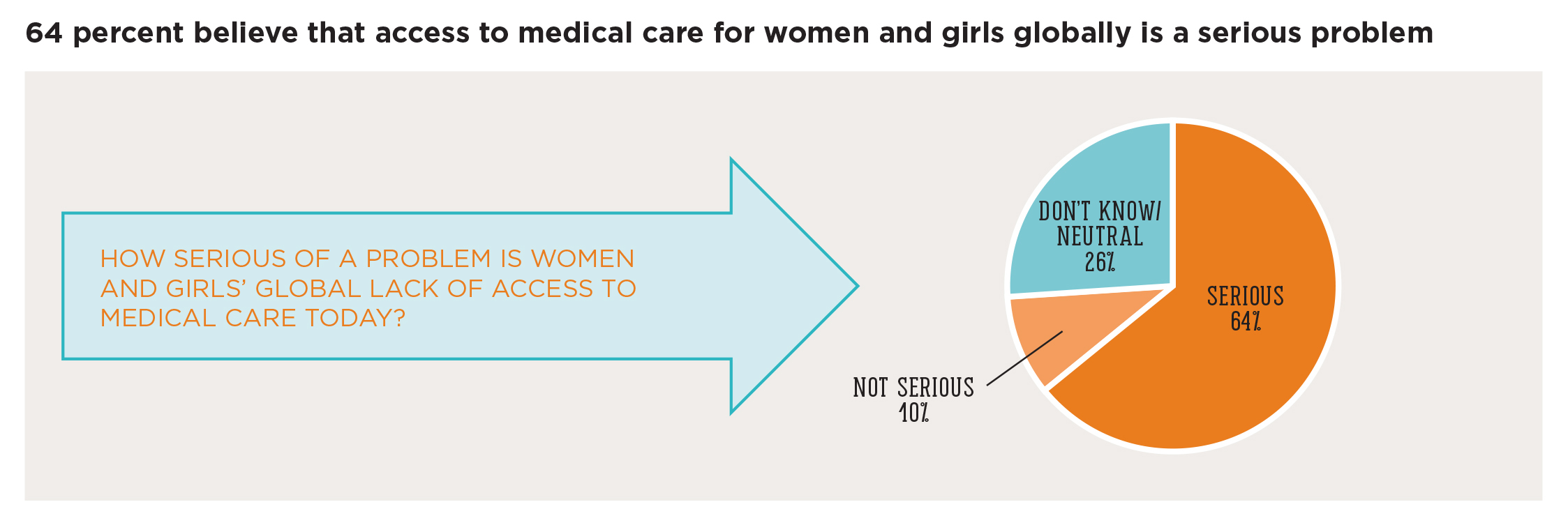Youth Advocacy in Action (Spring 2023)

A Message Everyone Can Get Behind
 PAI has been at the forefront of helping partners, policymakers and donors understand how harmful the Global Gag Rule (GGR) is to the health of women, girls and communities worldwide. Now we know the average American shares this sentiment.
PAI has been at the forefront of helping partners, policymakers and donors understand how harmful the Global Gag Rule (GGR) is to the health of women, girls and communities worldwide. Now we know the average American shares this sentiment.
I was not surprised by the results of the poll we conducted with the Center for Health and Gender Equity (CHANGE). The findings confirmed our long-held perceptions.
 Since PAI’s founding in 1965 by a group of concerned citizens, including a sizable contingent of mainstream Republican men, we have always known that the health of women and girls around the world has had bipartisan support—even if our current political leaders try to convince us otherwise. Reasonable people who care about the well-being of women and girls everywhere believe they should have access to contraception and reproductive health information. Full stop. No questions asked. Our survey results reaffirmed this truth—the bedrock of our work.
Since PAI’s founding in 1965 by a group of concerned citizens, including a sizable contingent of mainstream Republican men, we have always known that the health of women and girls around the world has had bipartisan support—even if our current political leaders try to convince us otherwise. Reasonable people who care about the well-being of women and girls everywhere believe they should have access to contraception and reproductive health information. Full stop. No questions asked. Our survey results reaffirmed this truth—the bedrock of our work.
It’s the kind of message we need at this moment in the United States. A moment where you could easily become convinced that most Americans are isolationists. But our polling demonstrates the opposite. It shows that average Americans of all political stripes deeply believe in the role of the U.S. in the world. They believe that we are stewards, that we have a moral obligation to invest in improving people’s health in under-resourced countries.
My hope is that you, PAI’s supporters, will join us in sharing this message that emerged from our polling research. It’s not a message that needs to be segmented and tailored based on where people live or their education level, race or income—a rarity in these times. The GGR does not help the U.S. lead in a way that’s moral or positive. Instead, this policy is about undermining key reproductive and other health benefits for women and girls globally. And we will not stand for that.
I hope that this issue of The Catalyst will be informative to you. And, that it will inspire you to be a voice against policies like the GGR that inject politics into health care and ultimately harm the health and rights of all people.
Sincerely,

Suzanne Ehlers
President and CEO
The U.S. midterm election on November 6 is a critical moment to ensure women’s reproductive health and rights remain top of mind. How can you, as a PAI donor, make this happen in your community?

One powerful approach is to educate candidates and fellow Americans about the Trump-Pence administration’s “Protecting Life in Global Health Assistance” policy, also known as the Global Gag Rule by its critics. The Global Gag Rule (GGR) prohibits foreign nongovernmental organizations from receiving U.S. global health assistance if they do not agree to cease providing services, information or referrals for abortions, or advocating for the legalization or liberalization of abortion services—even if they engage in these activities with their own, non-U.S. funds.
The GGR is already eroding health systems, undermining women’s health and threatening their lives. Our research in Ethiopia, Nigeria and Uganda shows that in the past year alone, the policy has resulted in the loss of access to trusted health providers, closure of clinics and halting of services to vulnerable groups, including adolescents and youth. The disruption caused by the GGR has dramatically delayed the implementation of several multimillion-dollar reproductive health programs and could even result in the termination of programs altogether.
“Protecting life?” a clinician in Nigeria said to us, referring to the policy’s official title. “This policy kills. You cannot protect the life you have not seen at the cost of the woman’s life.”
We now also know this policy is not universally embraced by Americans: a bipartisan survey commissioned by PAI and the Center for Health and Gender Equity (CHANGE) reveals that across age, education level, gender, race, political party and even abortion stance, nearly 60 percent of American voters oppose the GGR.
Not only do most voters oppose the United States government’s efforts to restrict other countries’ abortion-related efforts, a solid majority also thinks that the U.S. should actively help improve the health of women and girls around the world. This was true across political party, race and stance on abortion.
“What is clear from this national poll is that most Americans recognize the deeply harmful nature of this policy,” said Jonathan Rucks, PAI’s senior director of advocacy. “It shows us that there is support across the political spectrum for ending the Global Gag Rule.”
Look below to learn more about these powerful survey findings and for key points to share about the Global Gag Rule.
The Global Gag Rule (GGR) has been a political football between Republican and Democratic presidential administrations since it was instituted in 1984. But what does the average American think of the policy?
PAI and the Center for Health and Gender Equity (CHANGE) engaged Washington, D.C.-based public opinion research firms Lake Research Partners and American Viewpoint to conduct what we believe is the first nationwide bipartisan survey to gauge thoughts about
the expanded GGR under President Trump. We polled 1,000 Americans likely to vote
in the upcoming November 6 midterm election.
Here’s what we learned:



Bibi Eng is a planner. A strategist.
 She has to be, with her work for more than 20 years managing political and legal matters for the United Nations (UN) in places like Burundi, Sudan, Kosovo, Liberia and, these days, Central African Republic. As deputy director of the political affairs division for the UN stabilization mission in Central African Republic, Eng is routinely flagging risks and identifying opportunities for intervention as she guides the four teams she oversees.
She has to be, with her work for more than 20 years managing political and legal matters for the United Nations (UN) in places like Burundi, Sudan, Kosovo, Liberia and, these days, Central African Republic. As deputy director of the political affairs division for the UN stabilization mission in Central African Republic, Eng is routinely flagging risks and identifying opportunities for intervention as she guides the four teams she oversees.
Carrying out a similar forward-looking strategic approach—that benefits women and girls—is what in part attracted Eng to PAI and has anchored her long-time support in her personal capacity.
“More and more over the years, I was taken aback by how little of a strategic plan there was for humanity,” she said. “There’s dire poverty when I look around where I serve in Africa, and I’m wondering why there isn’t much more to support women, for getting women involved, to empower them in decision-making?”
“They need to have access to reproductive and maternal health care to be able to plan for themselves. That was really it for me,” Eng said. “I just don’t think we’re going to have a quality of life as a species if we don’t really empower one half of our population and allow them to be involved in planning for our future.”
So, when she stumbled across PAI—she believes it was in an article—and learned more about our effort to promote women’s reproductive health care and rights, Eng was impressed. That was eight years ago. She has been supporting PAI with a monthly gift ever since.
Eng has remained committed to PAI not only because the mission resonates, but also because PAI focuses on building partnerships with others in countries where Eng has worked or visited. “It’s always kept me going to see this impact [PAI is making] that involves local women as well as local organizations, civil society organizations and governments.”
“If I didn’t feel that PAI really had the level of engagement locally or the impact, I probably wouldn’t have continued giving this long.”
The views expressed here are those of Bibi Eng and do not necessarily reflect the views of the United Nations.
Your monthly investment in PAI’s impactful advocacy and rigorous research and analysis will help ensure that women and girls around the world can access the sexual and reproductive health care they deserve.
To set up a monthly donation, visit www.pai2020s.wpengine.com/donate and select the recurring contribution option at the bottom of the page or contact Daphney Jean at 202-557-3415.
We are fighting back against the onslaught of harmful policies that discard reproductive rights.
Stay informed about the issues impacting sexual and reproductive health and rights.
